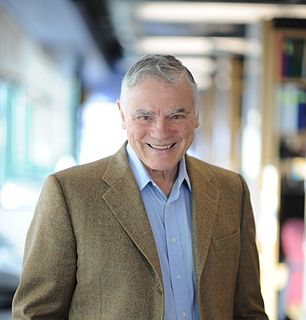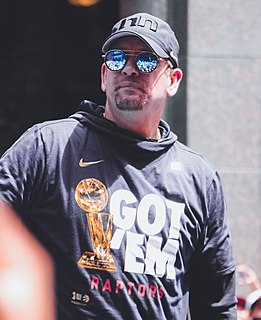Ein Zitat von Craig Venter
Ich denke, ich habe einige gute Dinge erreicht; das erste Genom der Geschichte gemacht – mein Team war phänomenal und alles, was sie zusammengebracht haben; Schreiben des ersten Genoms mit einer synthetischen Zelle; meine Teams am Venter Institute, Human Longevity und davor Celera.
Verwandte Zitate
Jede Zelle in unserem Körper, egal ob Bakterienzelle oder menschliche Zelle, hat ein Genom. Sie können dieses Genom extrahieren – es ist so etwas wie ein lineares Band – und Sie können es mit verschiedenen Methoden lesen. Ebenso wie eine Buchstabenfolge, die Sie lesen können, können Sie sie auch ändern. Sie können schreiben, bearbeiten und dann wieder in die Zelle einfügen.
Das erste, was Sie tun müssen, ist, das Neandertaler-Genom zu sequenzieren, und das wurde tatsächlich getan. Der nächste Schritt wäre, dieses Genom in, sagen wir, 10.000 Stücke zu zerhacken und dann alle Stücke in einer menschlichen Stammzelle zusammenzusetzen, was es Ihnen schließlich ermöglichen würde, einen Neandertaler-Klon zu erschaffen.
Wenn Sie ein persönliches Genom erhalten, sollten Sie in der Lage sein, persönliche Zelllinien zu erhalten, Stammzellen, die aus Ihrem erwachsenen Gewebe stammen und die es Ihnen ermöglichen, synthetische Biologie und Sequenzierung zusammenzuführen, sodass Sie Teile Ihres Körpers reparieren können, wenn Sie älter werden oder sich reparieren Dinge, die erbliche Störungen waren.
Die Frage ist: Gibt es nützliche Dinge, die wir mit den Ergebnissen einer Genomsequenz machen können und die einen Nutzen bringen würden? Und die Antwort lautet: Sollten heute die meisten Menschen ihr Genom sequenzieren lassen? Wahrscheinlich nicht. Aber gibt es bestimmte Umstände, unter denen die Genomsequenzierung wirklich hilfreich ist? Ja, das gibt es.
Als Christ, aber auch als Wissenschaftler, der für die Leitung des Humangenomprojekts verantwortlich ist, war eine meiner Sorgen die Grenzen der Anwendungsmöglichkeiten unseres Verständnisses des Genoms. Sollte es Grenzen geben? Ich denke, das sollte der Fall sein. Ich denke, die Öffentlichkeit hat ihre Besorgnis darüber zum Ausdruck gebracht, wie diese Informationen missbraucht werden könnten.
Wir haben 200 Billionen Zellen und das Ergebnis jeder von ihnen ist zu fast 100 Prozent genetisch bestimmt. Und das beweist unser Experiment mit dem ersten synthetischen Genom, zumindest bei wirklich einfachen Bakterien. Es sind die Wechselwirkungen all dieser separaten genetischen Einheiten, die uns die Physiologie verleihen, die wir sehen.
Beim Investieren gibt es immer eine Frage. Bist du zu früh, bist du zu spät oder liegst du genau richtig? Und es gab einen großen Hype um die Biowissenschaften, um die Sequenzierung des menschlichen Genoms, und viele Leute kamen zu dem Schluss, dass das nicht wirklich der Fall ist. Übrigens gab es rund um die Zeit des Jahrtausends und des menschlichen Genoms einen großen Hype um die digitale Revolution, und es stellt sich heraus, dass einige der größten und mächtigsten Unternehmen der Welt die Überlebenden dieses Absturzes sind.






























